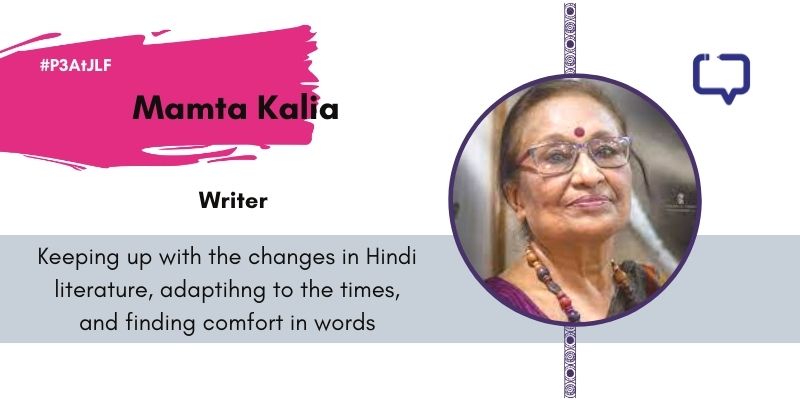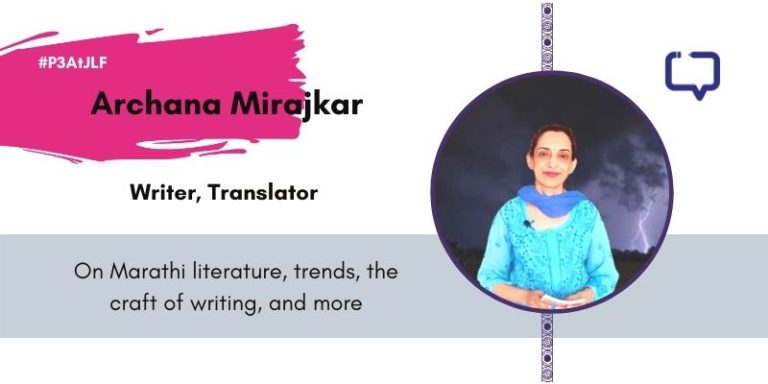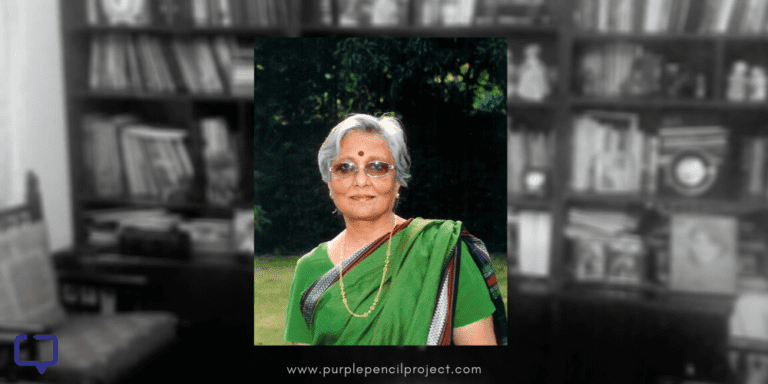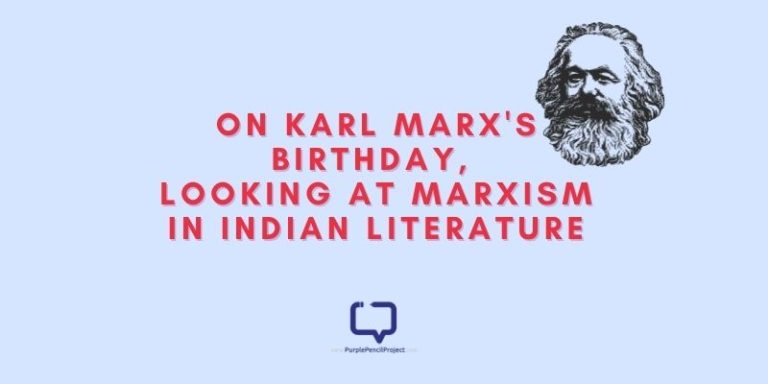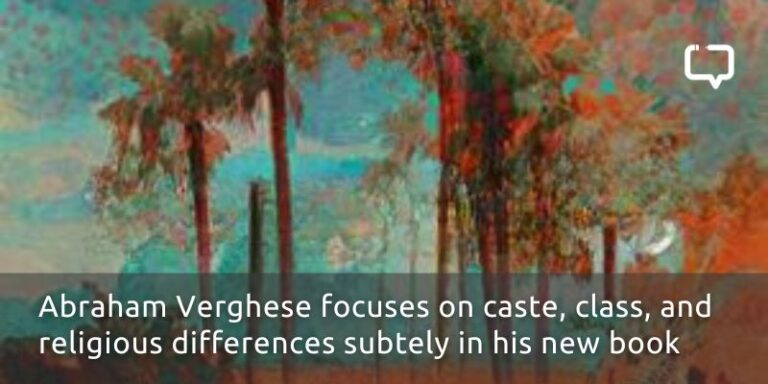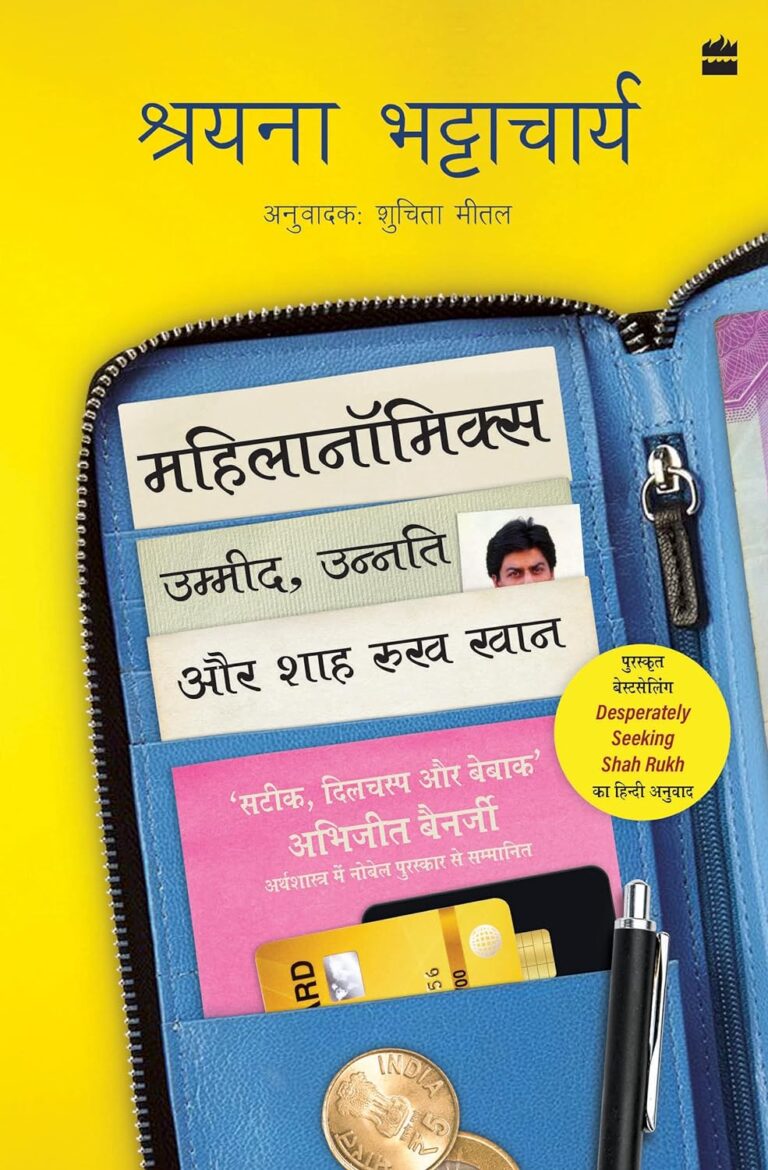Mamta Kalia, who is one of the speakers at the Jaipur Literature Festival 2022, spoke to Prakruti Maniar about Hindi Literature, observing the trends and changes in Hindi Literature, and more. Transcribed and edited from an interview taken over Zoom.
Prakruti Maniar to Mamta Kalia: The Jaipur Literature Festival is a fantastic opportunity for diverse Indian literatures to speak to each other, which is such an important thing for people of our country to underatand each other.
Mamta Kalia: That is true. मुझे लगता है कि भाषाओं को एक दूसरे से मिलना चाहिए।
It’s a very big platform for writers of all languages to meet and to share thoughts, because you see literature in its totality is just one. There is no division, there is no sub division. I was reading VS Khandekar and Kundanika Kapadia; I read Gujarati writers in translation when I was a teenager and I hardly knew that they are from some other language and they are not Hindi writers.
As a child, we moved a lot because of my father’s transfers, and later, because of my husband’s waywardness. So I’ve come in contact with writers of all languages. And I’ll find, the basic thing is, (that) everybody’s worried about the human condition. We all want better human conditions, isn’t it? And JLF has been performing this function to a great extent.
We belong to that generation, where we were not being divided by walls of differences. Now there are walls of communalism, of languages, all these were not there. Like we have been brought up by reading Tagore and Sarat(Chandra). We can hardly think of literature as being in compartments. And I think JLF is really doing a wonderful task in bringing the writers together. Even Sahitya Academy is doing this, to some extent.
At a time when politicians have failed to unify the world, when the social worker has their own limitations, I think it is literature and the writer who can go across borders, and who can encourage people to stand united.
For example, when I read the Bobbin poem, even then, I feel that this poet is talking the way I talk, the way I want to talk. It’s like that. तो मैं भले ही हिन्दी में लिखती हूं, मेरी चेतना लगातार सभी देशों और जातियों और भाषाओं की ओर जाता है। और ये जाति शब्द तो हमने कभी अपने घर में सुना ही नहीं था। क्योंकि हम सब मिलकर एक लेखक जाति हैं। हम एक प्रजाति हैं। We are a species of writers. We are weird. We don’t belong to a language. We belong to the worldwide view, isn’t it? And I really wish that Hindi finds some good translators, because Hindi has such a lot of range. And such a big reach of ideas, concepts, and, like I say, a vision, they have a vision. And that vision is not yet reflected in the translations that are actually available. I feel that a lot should be done in the way of translation. JLF could take this up. It would be a really big step.
Prakruti Maniar: Speaking of translations – have you thought of translating some of your works into English?
Mamta Kalia: I have translated some of my short stories. And I’ve translated a small, short novel by me. A novella, I’ve translated myself, but I’m not familiar. Now, I have moved away from the English writing word because basically I started writing in English. I have two collection of poems, Tribute to Papa and Poems ’78 by Writer’s Workshop, Calcutta, but the publisher closed down, and now, I have not been very active in this field. But I do feel that because I’m an original writer, translation, to me, is a slightly moved away sort of an interest. I take up a translation only when I’m very eager to have some story read by the wider world. And Sahitya Academy has been publishing translations of my short stories into English. They have been finding good readership and feedback. But this work has to be taken up in a big way because I have, say, about 65 books to my credit in Hindi.
Actually, हिंदी के लेखक की सबसे बड़ी त्रासदी यही है कि वो बेचारा अभी अपनी पूरी audience न पा सका। अपनी readership पूरी नहीं पा सका है। इतनी बातें हैं जो share करने वालीं हैं क्योंकि आज पूरा world जो है, एक screen के ऊपर stick हो गया है। Especially during these COVID times, we reach out to you through the screen. और ये screen अपने आप में बड़ा ही जादुई है, कितनी चीज़ें हमारे तक लाता है ये। हम किसी को miss नहीं करते क्योंकि हम यहां पर देख लेते हैं, हम पढ़ लेते हैं। और कितना कुछ पढ़ने को यहां मिलता है! लेकिन अभी बहुत काम बाकी है, इस क्षेत्र में।
Prakruti Maniar: That is true. There is a lot of work left in also how easy it is to discover these books. When I was researching about you, I did not see even a fraction of 65 works. It’s difficult to find this information on Google.
Mamta Kalia: हां, naturally, हां। Amazon पर सारी नहीं आती ना, Amazon पर कोई आती है, कोई नहीं आती है। या availability नहीं होगी। या हिंदी के प्रकाशक भी lethargic हैं। उनकी वैसे ही सरकारी बिक जाती है। ये सारी मिली जुली बातें हैं। Problem becomes more complicated like this. Because a writer cannot go out to sell like someone, door to door. We can only go from reader to reader, we can’t go from door to door.
आजकल देखिए, युवा लेखक, young writers, बहुत बड़ी तादाद में लिख रहे हैं हिंदी में। और उनमें इतनी variety है, इतनी readability है उनमें, कि जो भी उन्हें पढ़ेगा, वो एक बार के लिए तो चकित हो जाएगा। जैसे आपको मैं बताऊं कि पिछले दिनों में, बल्कि उनके उपन्यास translate भी हुए हैं। Harper Collins ने अखिलेश का उपन्यास, निर्वासन, Exile करके translate किया, और उसकी बड़ी handsome royalty भी दी है। और कितने ही और writers ऐसे हैं, जो translate हुए। चंदन पांडे की कहानियां कई बार ट्रांसलेट भी हुईं, और कई बार फिल्म बनी उनकी। मनोज पांडे एक बहुत original writer हैं, और उसकी भी कहानियां english में translate हुई हैं और blogs के ऊपर आती हैं। और इसी तरह से नीलाक्षी सिंह ने corporate world के ऊपर एक उपन्यास लिखा है, खेला। She, herself, knows English very well. I don’t know when she will decide to translate it.
और फिर आप ये देखिए कि और इतनी सारी लड़कियां हैं, जो journalism में आ गई हैं, और जो बहुत अच्छा काम कर रहीं हैं। जैसे कि, आकांक्षा पारे, works in Outlook, and her short stories are really out of the world. और गीताश्री, वंदना राग, प्रत्यक्षा, ये सारे हिंदी के नई generation के लोग हैं। और आपको बताऊं कि एक younger side और है, जो लिखता है और इसको कहता है: नई वाली हिंदी। और उनमें इतने अच्छे अच्छे नाम हैं, निलोत्पल मृणाल, सत्या व्यास, प्रवीण कुमार, बालेंदु द्विवेदी। इतने सारे नाम हैं, लड़कियों के भी बहुत सारे नाम हैं, अभिधा शर्मा, अंकिता जैन। ये सब लड़कियां English जानती हैं, लेकिन होता ये है कि original writing, मौलिक लेखन, आपको इतना occupied रखता है कि आप अपने या दूसरे के work को translate करने लायक leisure या free time नहीं निकाल पाते हैं।
वो काम किसी दूसरे को करना चाहिए because translation itself is a very hard task to master. You should have a good vocabulary and imagination both. You cannot translate words verbatim, you have to translate through imagination. When you grasp the content and the intent of the author, only then you can do it. तो मैं ये चाहती हूं कि कम से कम हमारे पास एक Translation Bureau होना चाहिए। जैसे के हमारे पास world-class translations हैं Russian writers के, Italian writers के, French writers के। सारी classics हम लोग पढ़ते हैं, और उन classics से relate करते हैं अपने को। Madame Bovary के बारे में हम कबसे पढ़ते चले आ रहे हैं, और आज तक बच्चे पढ़ते हैं उनके बारे में। पर इसकी तरह से जो आज के writers हैं, they need good translators.
Prakruti Maniar: You have had such a long literary career, and you have observed so many changes in the trends, in the author relationships
Mamta Kalia: जीते जी इलाहाबाद एक memoir है, संस्मरण है, जिसमें मैंने इलाहाबाद में जो literary world है, उसको capture किया है मैंने। और मेरे समय का जो literary world है, that is the late 20th century, that is the 9th and 10th decade of the 20th century, and the way we used to meet in the coffee house, the way we used to fight and write, the way we used to enlighten each other, the way we used to confuse each other, all this I’ve captured in जीते जी इलाहाबाद। इसीके साथ एक और मेरी किताब आई थी, रविकथा by वाणी प्रकाशन, उसमें मैंने लिखा है about Ravindra Kalia, my husband, who was a very eminent writer. उनके बारे में मैंने लिखा है, उनके सारे struggles, and उनकी सारी लापरवाहियां, (…) और उनकी सारी मस्ती मैंने उसमें डाली है। और वो भी, एक तरह से, literary world का ही एक दस्तावेज है, because we were two writers living together, and we were connected with all the writers of that time. ज्ञानरंजन, काशीनाथ सिंह, दूधनाथ सिंह, all these writers were living there. I feel so nice and proud that I have seen the best of writers of the last century and budding writers of the 21st century.

लेकिन ऐसा था उसमें, उस समय भी ये होता था, कि जो senior writers होते थे, वो हम लोगों को ज्यादा भाव नहीं देते थे। और वो ये मान कर चलते थे कि इनको थोड़ा level में रखना चाहिए, ये बहुत उछल रहे हैं। जैसे कि आजकल के young writers को हो सकता है ये तकलीफ़ हो। जबकि मैं चाहती हूं हमेशा कि मैं अपना connection कभी भी weak ना होने दूं। मैं younger generation को बहुत पढ़ती हूं, लेकिन हमारे समय में भी ये senior और junior writers का टकराव चलता था। अभी भी चलता है ये, but the dialogue should remain, the dialogue shouldn’t go to a deadlock. मैंने, और रविंद्र कालिया ने, और बाकी जो हमारी पीढ़ी थी, ज्ञानरंजन, काशीनाथ सिंह, दूधनाथ सिंह, हम सब लोगों ने हमेशा कोशिश की कि younger generation को आगे बड़ाओ। जो हमारे बाद के लेटर writers हैं, they should come forward.
So the literature you see is a flowing stream, it should not end at me, it will keep going on. तो हम लोगों को better यही है कि we treat it like a relay race. I hold and I pass on my baton to you.
Prakruti Maniar: That’s so true. Are you working on something right now?
Mamta Kalia: जी हां, जी हां, अभी आजकल भी मैं लिख रही हूं, और कविताऐं तो ये हैं कि हमेशा ही लिखती रहती हूं मैं। कभी ना कभी, कोई ना कोई कविता अचानक flash कर जाती है। और, you see, literature बहुत depend करता है flashes के ऊपर। Of course after that you need a little structure and you need a lot of thought about it. लेकिन flashes are also very important. जैसे मैं आपको छोटी सी अपनी एक कविता सुनाती हूं। इसलिए क्योंकि आपको ज़रा सा idea देना चाहती हूं मैं।
मेरे अंधेरे में, सिर्फ एक जुगनू था
मेरी फुलवारी में सिर्फ एक गुलाब
मेरे आकाश में सिर्फ एक तारा था
मेरी नदी में सिर्फ एक नाव
एक ही एक पर टिका था संसार
एक तार पर गाया हुआ अभंग
कितना अकेला
कितना उदास होता है
और भी नदियां थीं
जो तुम तक उमड़ती थीं
मेरे पास प्यास थी
तुम्हारे पास पानी
जब मैं देखती
कोई नदी तुम तक उमड़कर आती है
मैंने बस इतना किया
अपने प्यास को ही पी लिया
नहीं, अभी मैं अपना collection तैयार कर रही हूं, एक और किताब भी लिख रही हूं। क्योंकि मैं बिल्कुल अकेले रहती हूं, और मेरे पास यही दो occupations हैं, reading and writing, I keep reading all the time.
क्योंकि हम सब मिलकर एक लेखक जाति हैं। हम एक प्रजाति हैं।
Prakruti Maniar: Yeh ho gayi Mamta Kalia, the writer ki baatein. What are you reading now?
Mamta Kalia: मैं इस समय दो किताबें पढ़ रही हूं। एक तो मैं reread कर रही हूं, The Paris Review Interviews, ये बहुत ही famous है। और एक किताब जो मुझे बहुत ही अच्छी लग रही है, शशि थरूर की Why I Am A Hindu. I want to understand Hinduism, I want to understand what is the entire concept coming down the ages? And he has a very good command of the English language. इधर मेरे पास bucket list है, जिसमे बहुत किताबें हैं। हरि भटनागर का उपन्यास दो गज ज़मीन पर है उसमें। फिर मेरे पास हिंदी magazines आई हुई हैं, मृणाल पांडे और राजेश जोशी पर बनास जन के दो बहुत अच्छे अंक निकले हैं, वो मैं पढ़ रही हूं इस समय (…)। तो मेरा बिस्तर आधा भरा रहता है किताबों से, और मुझे अच्छा लगता है, this gives me a good sleep. And मैं लगातार कोई ना कोई चीज़ पढ़ती रहती हूं। एक ज़माना था जब हमलोग दिलीप चित्रे और हेमन्त दिवटे को पढ़ते थे। अब ये लोग इतने बड़े writers हो गए हैं, तब हमने साथ साथ लिखना शुरू किया था एक समय। अच्छा लगता है, ये ऐसी दुनिया है कि जिसमें मुझे लगता है सबसे कम tension है। ये बहुत अच्छी दुनिया है, लेखकों की दुनिया।

As part of our effort to compensate our writers better, we at Purple Pencil Project have launched the #PayTheWriter initiative, where readers can directly show support and appreciation for our wonderful team.
Scan or upload this image on your UPI app, and show them the love 😀







